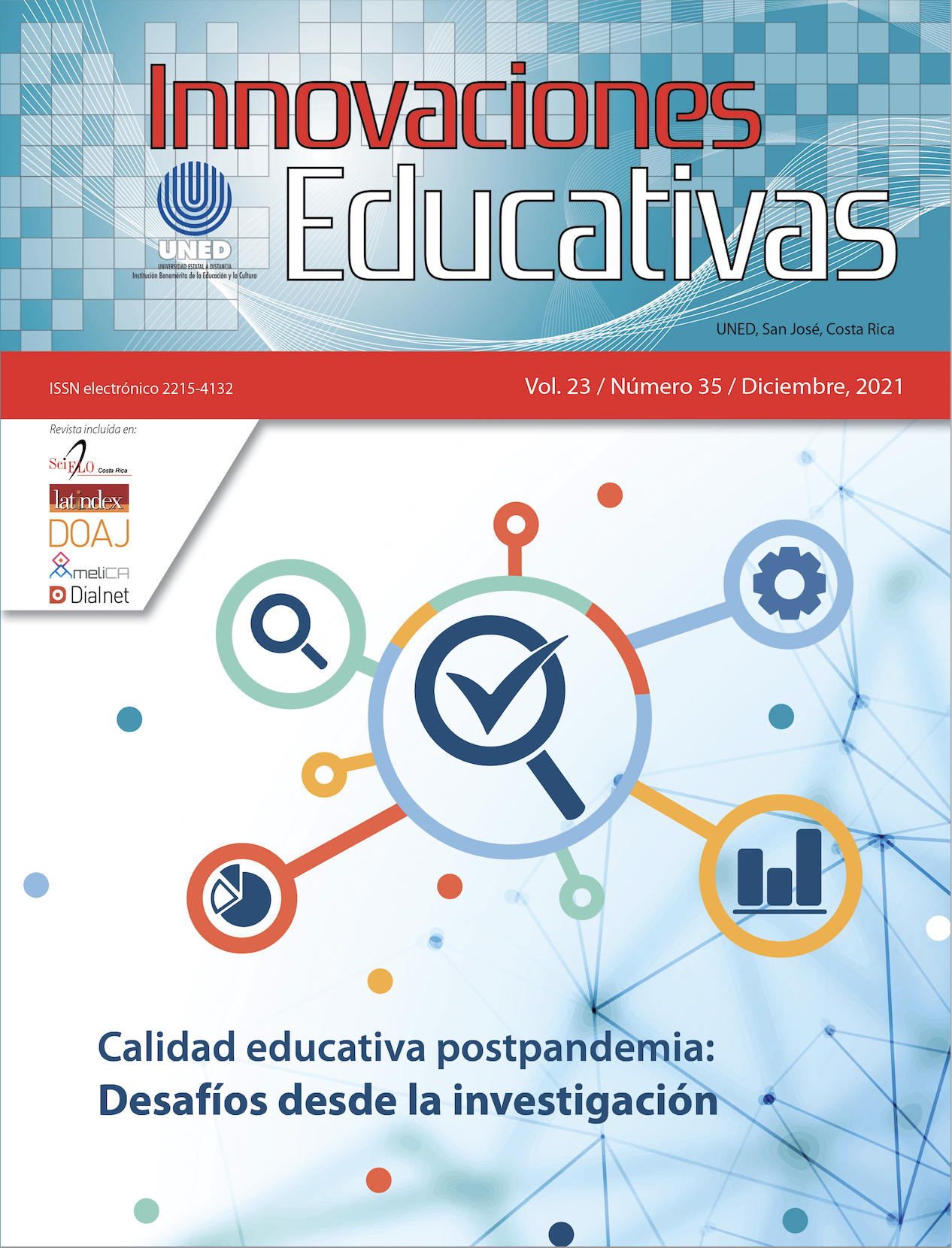Experience of the Supervised Professional Practice course of the Guidance major, in remote modality, National University, Costa Rica during the year 2020
DOI:
https://doi.org/10.22458/ie.v23i35.3559Keywords:
pedagogical guidance, higher education, university student, pandemic, remote presence, educationAbstract
In the context of the pandemic caused by the virus responsible for COVID-19, there are innumerable changes at a global level in the face of an emerging reality. Therefore, higher education takes on the challenge of transforming traditional methodologies. Given this, the objective of this systematization is to analyze the methodological and assessment modifications in the Supervised Professional Practice course of the Guidance major in 2020, developed in a remote modality. The analysis is viewed from the role of the academic person in charge of the course and the items corresponding to the evaluation, which shows that the remote face-to-face modality influenced the implementation of new skills, both of the teaching staff in the planning of the class sessions as well as for students when doing their practice. For this reason, a practice planned and executed from the contextual reality is evidenced, an aspect that generates a greater bond of the students with their work. The main conclusion is that the remote modality in Supervised Professional Practice must be maintained by 2021, since it would not be convenient to expose the student body to health risks, relocation of residence, job changes and readjustments in the personal and family sphere. In addition, from the student and teaching experience, positive results of the execution from this modality stand out.
References
CAF-CEPAL. (2020). Las oportunidades de la digitalización en América Latina frente al Covid-19. Recuperado de https://repositorio.cepal.org/bitstream/handle/11362/45360/OportDigitalizaCovid-19_es.pdf?sequence=4&isAllowed=y
Camacho, S., Átala, C., Maldonado, G., Álvarez, A., Flores, T., y Santander, T. (2011). Proceso De La Investigación Cualitativa; Epistemología. Recuperado de https://www.uaeh.edu.mx/scige/boletin/tlahuelilpan/n4/r2.html
Comisión Económica para América Latina y el Caribe (CEPAL)/Organización de Estados Iberoamericanos para la Educación, la Ciencia y la Cultura (OEI), (2020). “Educación, juventud y trabajo: habilidades y competencias necesarias en un contexto cambiante”, Documentos de Proyectos (LC/TS.2020/116), Santiago, Comisión Económica para América Latina y el Caribe (CEPAL). Recuperado de https://repositorio.cepal.org/bitstream/handle/11362/46066/4/S2000522_es.pdf
Decreto Ejecutivo 42227-MP-S. (2020). Declaratoria de Estado de Emergencia Nacional. Recuperado de: http://extwprlegs1.fao.org/docs/pdf/cos194273.pdf
Hodges, C.; Moore, S.; Lockee, B.; Trust, T. y Bond, A. (2020). The Difference Between Emergency Remote Teaching and Online Learning. En Educause Review. Recuperado de https://er.educause.edu/articles/2020/3/the-difference-between-emergency-remote-teaching-and-online-learning
García, F., Corell, A., Abella, V., y Grande, M. (2020) La evaluación online en la educación superior en tiempos de la COVID-19. Education in the Knowledge Society, 21(12). doi:10.14201/eks.23013
González, K. (2020). Del aula presencial a la remota y de regreso: la enseñanza en situaciones de pandemia e incertidumbre. Revista Panamericana De Pedagogía, 31(2021), 10-25. doi: E-ISSN2594-2190.
Moreira y Delgadillo (Enero-marzo 2014). La virtualidad en los procesos educativos: reflexiones teóricas sobre su implementación. Tecnología en Marcha, 28(1):121-129. Recuperado de https://www.scielo.sa.cr/pdf/tem/v28n1/0379-3982-tem-28-01-00121.pdf
Moreno, T. (Abril-junio 2009). La Evaluación Del Aprendizaje En La Universidad. Tensiones, Contradicciones y Desafíos. RMIE, 14(41):563-591. Recuperado de: http://www.scielo.org.mx/pdf/rmie/v14n41/v14n41a10.pdf
Peña, C. y Vargas, L. (2020). La práctica profesional, retos y desafíos para el apoyo organizacional. Bogotá: Corporación Universitaria Minuto de Dios. UNIMINUTO, 2020. Recuperado de https://repository.uniminuto.edu/bitstream/handle/10656/11233/Libro_Internas-La%20practica%20profesional%2c%20retos%20y%20desafios%20para%20el%20apoyo%20organizacional_2020.pdf?sequence=1&isAllowed=y
Salgado, E. (2006). Manual de Docencia Universitaria. Introducción al Constructivismo en la Educación Superior. Editorial ULACIT. Recuperado de https://www.researchgate.net/publication/234672807_Manual_de_Docencia_Universitaria_Introduccion_al_Constructivismo_en_la_Educacion_Superior
Sánchez, A. (Febrero-mayo 2010). El artículo sistematización de experiencias: construcción de sentido desde una perspectiva crítica. Revista Virtual Universidad Católica del Norte, 29:1-7. Recuperado de https://www.redalyc.org/pdf/1942/194214466001.pdf
Sánchez, J. (2003). La Docencia Universitaria. Para un manifiesto antipedagógico. Quito, Ecuador: Ediciones Abya-Yala. Recuperado de: https://digitalrepository.unm.edu/cgi/viewcontent.cgi?article=1136&context=abya_yala
Universidad Nacional. (2017). Normativa Institucional. Publicado en La Gaceta Diario Oficial n.° 7-2017 del 15 de junio de 2017. Recuperado de: https://documentos.una.ac.cr/bitstream/handle/unadocs/8213/UNAGACETA72017_firmado.pdf?sequence=1&isAllowed=y
Consejo Académico-Universidad Nacional. (2020). Acta de la Sesión Ordinaria N.º 8-2020. Recuperado de: https://www.consaca.una.ac.cr/index.php/documentos/category/60-a2020
Zielińsk, K., Jaruga, A., Hofmann, R., Marinova, T., Plewczynski, M., Kerler, M. (2012). Webinar methodology. Webinar2learn. Recuperado de: https://ec.europa.eu/programmes/erasmus-plus/project-result-content/9dfd6607-60f7-4b3d-870e-6be51d4b15df/metodyka_EN_FINAL.pdf









